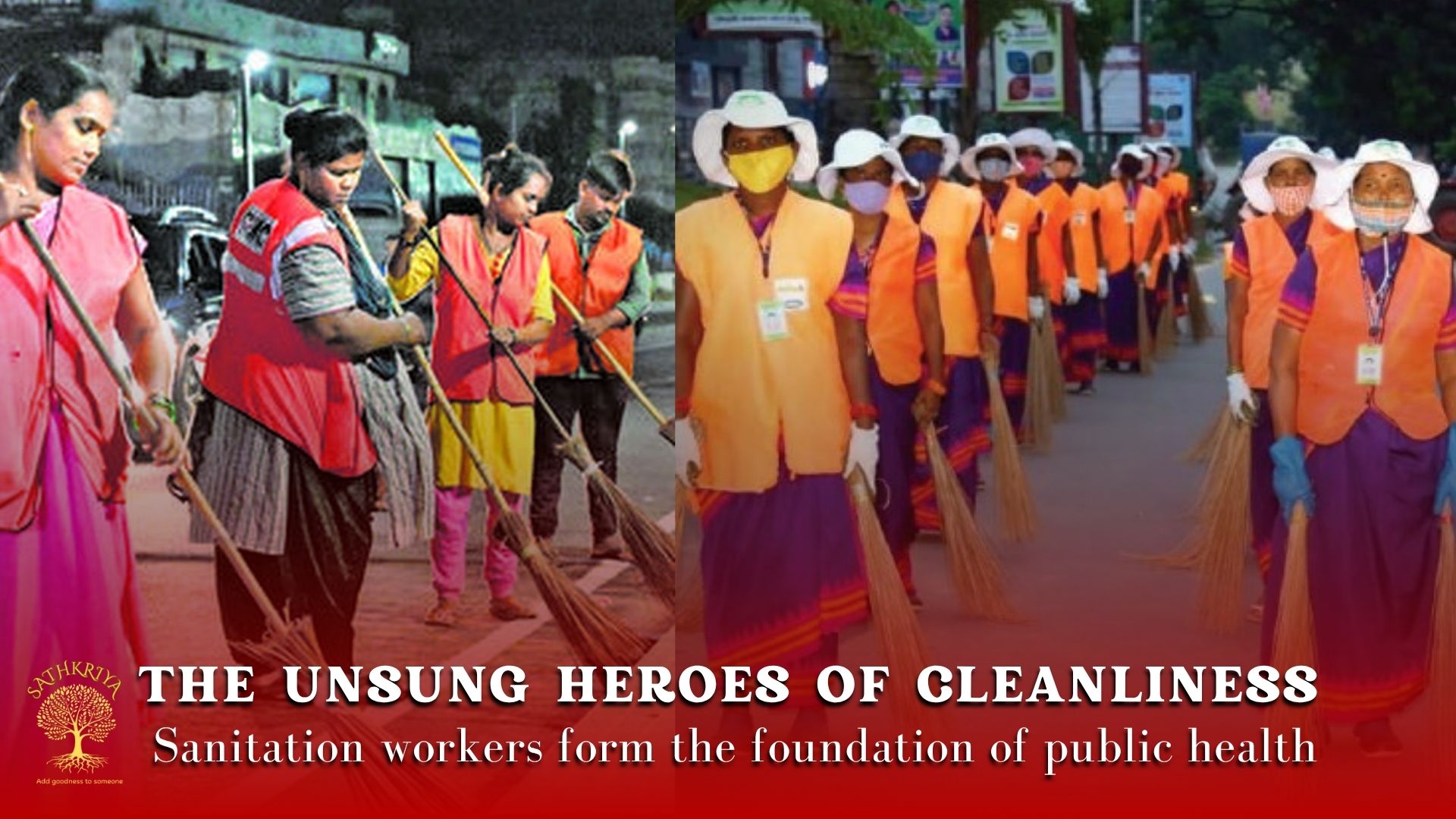The city wakes up before the sun. Streetlights hum, a bus sighs to a stop, and a broom whispers across the curb. In quiet minutes, crews move through empty lanes, collecting what the night left behind. You may not see them, but their work is the first line of safety each day.
Here is the truth: sanitation workers form the foundation of public health. They work under municipal corporations and urban local bodies, and they keep neighborhoods safe from disease and decay. This post explains what they do, why it matters, and how we can support them with respect, better tools, and simple daily habits.
They protect water, air, and sidewalks. They reduce germs, pests, and mess. And with a bit of help from all of us, their work goes even further.
What Sanitation Workers Do To Keep Cities Healthy

Street Sweeping and Litter Control Keep Neighborhoods Safe and Walkable
Before most alarms ring, sweepers clear dust, leaves, and food scraps. Clean curbs keep storm drains open, so rainwater moves where it should. Fewer puddles mean fewer slips, fewer pests, and fewer foul smells. People walk more, kids play outside, and blocks feel cared for.
Waste Collection and Sorting Reduce Disease and Boost Recycling
Door-to-door pickup keeps trash from sitting out and rotting. Tied bags protect crews from sharp items and leaks. Separating wet, dry, and hazardous waste makes sorting safer and smarter. Composting cuts landfill use and produces soil, which is good for health and climate.
Sewage and Wastewater Treatment Protect Drinking Water
Teams check sewer lines, unclog drains, and repair breaks. At treatment plants, water is filtered and disinfected before release or reuse. This blocks harmful germs from flowing into rivers and wells. After heavy rain, quick action prevents backups and outbreaks.
Clean Public Toilets and Community Hygiene Stop Outbreaks
Attendants scrub surfaces, restock soap, and fix broken fixtures. Clean, working toilets reduce open defecation and protect shared spaces. This supports dignity, school attendance, and safer markets. Fewer stomach illnesses follow when hygiene is available and reliable.
Why Sanitation Workers Form the Foundation of Public Health
Let’s say it clearly: sanitation workers form the foundation of public health. When they do their jobs well, the whole city functions better. You can measure the gains in stronger families, safer tap water, and less money spent on doctor visits.
Health improves first. Clean streets, safe toilets, and treated water break the chain of infection. Germs do not spread as fast when surfaces are clean and waste is handled right. Kids miss fewer days, and older adults stay safer.
The gains ripple through daily life. Shops open on time because staff are not sick. Buses run smoothly on clear roads. Parks smell fresh, so more people use them. Neighborhoods feel welcoming, which builds trust.
City budgets benefit too. Fewer disease outbreaks mean lower emergency costs. Better sorting and composting delay the need for new landfills. Planned routes save fuel and time. Small wins stack up into big savings.
How Clean Streets and Safe Water Prevent Disease
A clean block keeps flies, rats, and stray animals away from your doorstep. Handwashing stations and soap near toilets reduce the spread of germs. Safe water is a simple shield against stomach bugs and skin infections. Together, these basics protect families every day.
The Hidden Economic Benefits: Fewer Sick Days and Lower City Costs
Healthy people show up to work and school, which lifts incomes and learning. Families save on medicine and clinic trips. Cities spend less on emergency cleanups when routine upkeep is strong. It adds up to calmer budgets and stronger communities.
Working Under Municipal Corporations and Urban Local Bodies
Crews are hired, trained, and guided by municipal corporations and urban local bodies. These offices set routes, manage budgets, and prepare for floods or festivals. They buy equipment, set safety rules, and handle citizen complaints. Good planning makes clean cities possible.
Real People, Real Impact: A Day in the Life of a Sanitation Crew
Before dawn, a crew gathers for roll call and route maps. Gloves on, masks set, and reflective vests clipped, they head out. A driver, a sweeper, and a loader work in sync. By midday, the block is cleaner, and the team feels proud.
Challenges They Face and How You Can Help Today
The job is tough. Risks come from traffic, sharp objects, and harsh weather. Some crews lack steady gear or face rude behavior on the street. Still, with the right tools and respect, their impact can grow fast. Here is how we can help together.
We can push for safe equipment, steady training, and fair pay. We can sort our trash, close our bags, and keep sidewalks clear. City leaders can invest in better trucks, sensors, and composting sites. Small actions build safer streets for everyone.
Safety First: Protective Gear, Training, and Safe Equipment
Real risks include needles, broken glass, chemicals, and speeding cars. Crews need gloves, masks, sturdy boots, and reflective vests. Equipment must be serviced, and trucks should have working lifts and lights. Regular training keeps teams ready for floods and spills.
Dignity and Fair Pay for Essential Work
This work deserves steady pay, benefits, and respect. A simple thank you goes a long way. Drive slowly near crews, give them space, and report harassment. Treat the people who protect your street like the neighbors they are.
Smarter Tools and Green Technology Make the Job Easier
Mechanized sweepers handle long roads with less dust. Sealed trucks stop leaks and odors. Route planning cuts fuel and saves time. Leak sensors warn teams before pipes burst, and composting sites turn kitchen scraps into useful soil.
Simple Things You Can Do: Sort Waste, Close Bags, Do Not Litter
- Separate wet and dry waste every day.
- Tie bags tightly and keep sharp items wrapped.
- Rinse jars and cans before recycling.
- Keep sidewalks clear so sweepers can work safely.
- Report illegal dumping to local helplines.
Conclusion
Clean streets and safe water do not happen by luck. They happen because people in bright vests show up at dawn and keep our cities safe. Remember, sanitation workers form the foundation of public health, and their work supports every home, school, and shop.
Respect your local crews. Sort your waste and follow pickup rules. Back better gear and training through local policy and budgets. The next time you step onto a clean sidewalk, take a second to notice the hands that made it possible. Would you join them by doing your part today?




